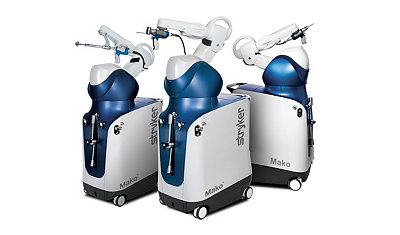Mako
Robotic-Arm Assisted Surgery
Looking for a way to differentiate your practice? Mako enables you to have a more predictable surgical experience when performing joint replacement surgery. The current Mako System offers Partial Knee, Total Hip and Total Knee applications.

The demand for orthopaedic procedures is set to increase dramatically over the next 15 years.1
Mako is backed by more than 50 published peer reviewed clinical publications, plus more than 350 scientific abstracts accepted at peer reviewed scientific conferences. Over 100,000 total Mako procedures have been performed to-date.2
Related products

Enhanced planning
Patient-specific pre-operative plan enables more accurate implant positioning.3-7 CT data is segmented to create a 3D model of the patient’s bony anatomy. An individualized pre-operative plan is created and reviewed with you prior to the Mako procedure.

Dynamic joint balancing
Surgeon-controlled intra-operative adjustments can be made to optimize implant placement.8 Kinematic and soft tissue data are collected intra-operatively and applied to the virtual CT model.
You can review the pre-op plan and can modify it if necessary based on the intra-operative data to virtually balance the joint and achieve individualized placement.

Robotic-arm assisted bone preparation
You can execute the individualized intra-operative plan using robotic-arm assisted bone preparation to achieve functional implant positioning.
A retrospective analysis of the OptumInsight commercial claims database (2013-2015) by Baker Tilly, LLP, at the request of Stryker, demonstrated that lower all-cause readmission rates associated with Mako Partial Knee procedures in the database population translated to 40% lower readmission costs @ 30 days and 66% lower readmission costs @ 90 days, compared to manual partial knee surgery – a savings per episode of $14,958 @ 90 days.9

| Episode Length | 30 Days | 90 Days | ||
|---|---|---|---|---|
| Metric | Readmission rate (%) |
Allowed per readmission ($) |
Readmission rate (%) |
Allowed per readmission ($) |
| Non-robotic | 1.10% | 15,881 | 4.20% | 25,286 |
| Robotic assistance | 0.70% | 15,009 | 3.50% | 10,328 |
| % Difference | 36.36% | 872 | 16.67% | 14,958 |
| Overall readmission cost reduction 66% | 40% | 66% | ||
References:
- Kurtz AAOS. Total knee and hip replacement projections 2030. www.prnewswire.com/news-releases/total-knee-and-hip-replacement-surgery projections-show-meteoric-rise-by-2030-55519727.html. Accessed July 4, 2016.
- Stryker's sales data.
- Jerabek SA, Matt Thompson, Carroll KM, Mayman DJ, Padgett DE. Accuracy of Cup Positioning, COR Restoration and Achieving Desired Hip Length and Offset with Robotic Total Hip Arthroplasty.
- Lonner, JH; John, TK; Conditt, MA. Robotic Arm-Assisted UKA Improved Tibial Component Alignment: A Pilot Study. Clin Orthop Relat Res. July 2009. 468(1): 141-6.Ěý
- Dunbar, NJ; Roche, MW; Park, BH; Branch, SH; Conditt, MA; Banks, SA. Accuracy of Dynamic Tactile-Guided Unicompartmental Knee Arthroplasty. Journal of Arthroplasty. May 2012. 27(5): 803-808.e1.Ěý
- Lonner, JH. Robotic-Arm Assisted Unicompartmental Knee Arthroplasty Seminars in Arthroplasty. 2009. 20(1): 15-22.Ěý
- Esposito CI; Lipman J; Carroll KM; Jerabek SA; Mayman SA; Padgett DE. Acetabular Component Cup Placement Using a Haptically Guided Robotic Technology in Total Hip Arthroplasty. 16th EFORT Congress, May 28-30, 2015, Prague, Czech Republic.
- Elson L, Dounchis J, Illgen R, Marchand R, et al. Precision of acetabular cup placement in robotic integrated total hip arthoplasty. Hip Int 2015; 25(6):531-536.
- Baker Tilly, LLP. Mako Robotic-Arm Assisted System: A Clinical and Economic Analysis for Health Plans and Providers, 2016.
MKOSYM-WC-4_15233
